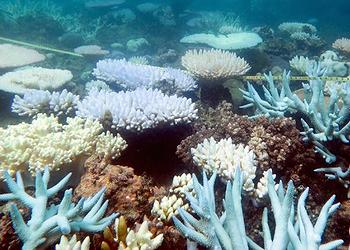
TOWNSVILLE, Queensland, Australia, April 18, 2018 (ENS) – Corals on the northern part of the world’s largest coral reef, Australia’s Great Barrier Reef, experienced a catastrophic die-off following the extended marine heatwave of 2016, finds a new study published online today in the journal “Nature.”
“When corals bleach from a heatwave, they can either survive and regain their colour slowly as the temperature drops, or they can die. Averaged across the whole Great Barrier Reef, we lost 30 percent of the corals in the nine month period between March and November 2016,” explained Professor Terry Hughes, director of the Australian Research Council’s Centre of Excellence for Coral Reef Studies, Coral CoE.

The scientists mapped the geographical pattern of heat exposure from satellites, and measured coral survival along the 2,300-km length of the Great Barrier Reef following the extreme marine heatwave of 2016.
The amount of coral death they measured was closely linked to the amount of bleaching and level of heat exposure, with the northern third of the Great Barrier Reef being the most severely affected.
The study found that 29 percent of the 3,863 reefs comprising the world’s largest reef system lost two-thirds or more of their corals, transforming the ability of these reefs to sustain full ecological functioning.
“The coral die-off has caused radical changes in the mix of coral species on hundreds of individual reefs, where mature and diverse reef communities are being transformed into more degraded systems, with just a few tough species remaining,” said co-author Professor Andrew Baird of Coral CoE at James Cook University in Townsville.
“As part of a global heat and coral bleaching event spanning 2014-2017, the Great Barrier Reef experienced severe heat stress and bleaching again in 2017, this time affecting the central region of the Great Barrier Reef,” said co-author Dr. Mark Eakin of the U.S. National Oceanic and Atmospheric Administration, NOAA.
“We’re now at a point where we’ve lost close to half of the corals in shallow-water habitats across the northern two-thirds of the Great Barrier Reef due to back-to-back bleaching over two consecutive years,” said Professor Sean Connolly of Coral CoE at James Cook University.

“But, that still leaves a billion or so corals alive, and on average, they are tougher than the ones that died. We need to focus urgently on protecting the glass that’s still half full, by helping these survivors to recover,” said Hughes.
Coral bleaching events not only whitewash corals, but can also reduce the variety of fish occupying these ecosystems, according to new research published earlier this month led by Coral CoE PhD student Laura Richardson.
The study was conducted by researchers at James Cook University and Lancaster University, in the UK, who examined 16 reefs off Lizard Island, in the northern section of the Great Barrier Reef. The quantity and types of coral and fish species were surveyed before, during and after the 2016 mass bleaching event caused by a global heatwave.
“The widespread impacts of heat stress on corals have been the subject of much discussion both within and outside the research community. We are learning that some corals are more sensitive to heat-stress than others, but reef fishes also vary in their response to these disturbances,” said Richardson.
Following the bleaching event, researchers recorded a sharp drop in the diversity of fish communities as the mix or species changed. Fish that are highly dependent on branching corals, such as butterflyfish, declined the most.
The scientists say these findings reinforce the need for assessing the risk of a wide-scale collapse of reef ecosystems, especially if global action on climate change fails to limit warming to 1.5 to 2°Celsius above pre-industrial levels.
The study is unique because it tests the emerging framework for the International Union for Conservation of Nature (IUCN) Red List of Ecosystems, which seeks to classify vulnerable ecosystems as Safe, Threatened or Endangered.
“The Great Barrier Reef is certainly threatened by climate change, but it is not doomed if we deal very quickly with greenhouse gas emissions. Our study shows that coral reefs are already shifting radically in response to unprecedented heatwaves,” said Hughes.
The researchers warn that failure to curb climate change, causing global temperatures to rise far above 2°C, will radically alter tropical reef ecosystems and undermine the benefits they provide to hundreds of millions of people, mostly in poor, rapidly-developing countries.
Copyright Environment News Service (ENS) 2018. All rights reserved.
© 2018, Environment News Service. All rights reserved. Content may be quoted only with proper attribution and a direct link to the original article. Full reproduction is prohibited.
